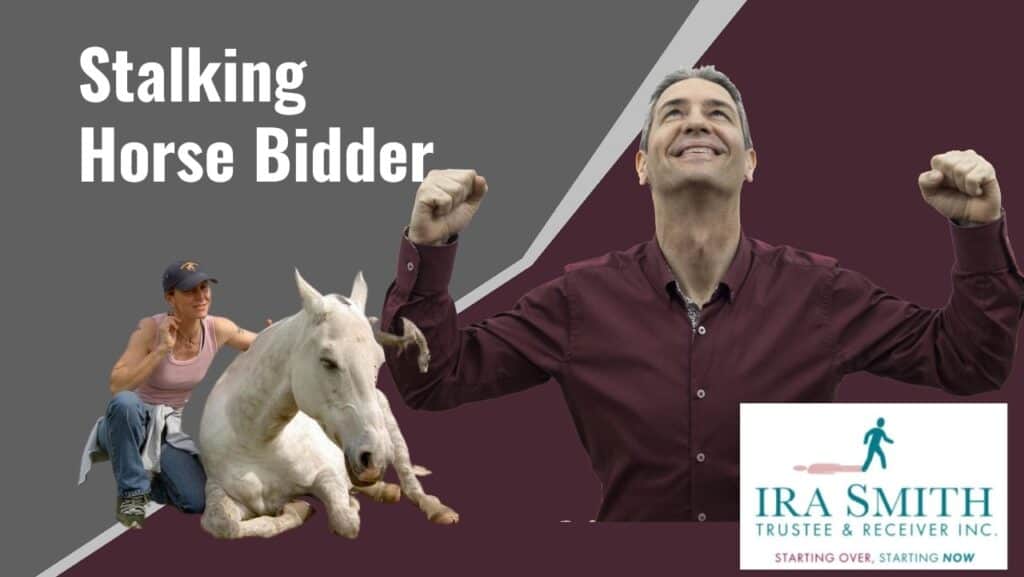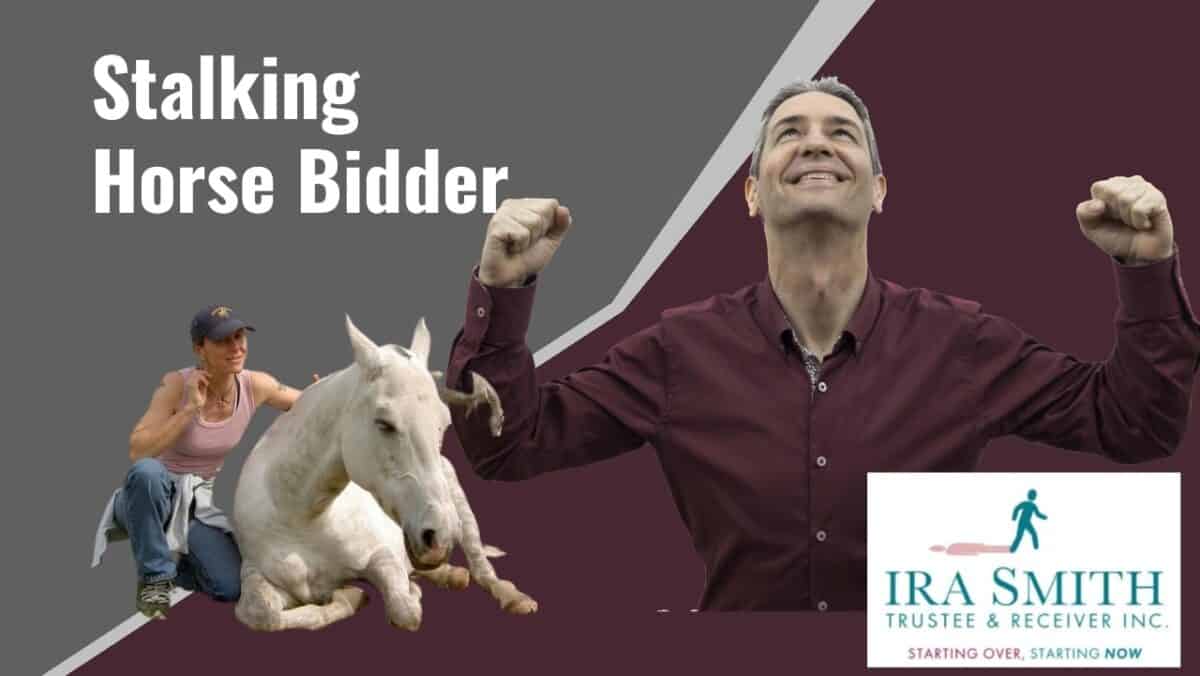What is a stalking-horse bidder?
A stalking horse bidder is basically a potential buyer who’s interested in making a public bid for an insolvent company’s assets. The stalking horse bidder gets to be the first one to check out the assets and enter into an agreement to purchase them. The agreement negotiated with the licensed insolvency trustee acting as the court-appointed officer sets the lowest price the company’s creditors would get if sold in the receivership or bankruptcy.
If the stalking horse bidder enters into an agreement, and no better offers come in, they’ll be able to purchase the company’s assets. If someone offers more than the stalking horse bidder during the auction and that higher offer is the one that gets court-approved and completed, then the stalking horse bidder is entitled to receive compensation for allowing their bid to be public.
In this Brandon’s Blog post, I describe a case we are currently working on that describes what the stalking horse process is all about, and how the stalking horse bidder either ends up with the assets it bid on or gets paid for not being the successful bidder.
What are the benefits of being a stalking horse bidder?
There are several key benefits and potential advantages to being a stalking horse bidder. For one, you get to negotiate the sale terms (both legal and financial) with the seller, compared to other potential bidders who are presented with a court-approved form of agreement that has already been negotiated for the assets for sale. As the stalking horse bidder, you also have the advantage of being the first bidder in line, which could give you a better chance of winning the auction.
The stalking-horse bidder is allowed to complete due diligence before any other competing bidders, giving them the advantage. This is a privileged position that allows them to make a bid they believe gives them the best chance of success. This includes taking the time to review the company’s financial records and talk to the management and employees, in order to gain a better understanding of the business.
The stalking horse bidder also has the opportunity to engage critical suppliers and large customers to gauge their willingness to work with the stalking horse bidder if its bid is successful.
The stalking-horse bidder is protected from incurring costs as the first bidder. It can negotiate the terms of its break-up fee and expense reimbursements for costs incurred to hire legal and financial advisors, conduct due diligence, and other expenses incurred in formulating its offer.
The costs of the stalking horse bidder are reimbursed from the sale of the assets of the company, but this is subject to the approval of the court. If the stalking horse bidder is not a successful purchaser, the reimbursement will take place.
When is it appropriate to use the stalking horse bidder as an option?
My firm has been appointed by the court as the receiver of a green technology financially distressed company. We are currently in the process of developing a stalking horse sales process in order to sell the assets of the company. Once we have received court approval, we will be able to implement the plan.
We are still developing the entire sales process, including the bidding procedures. As we don’t have court approval yet, I can only describe how we’ll recommend it to the court, and I can’t mention any real names.
As the court-appointed receiver, we took possession of the assets and found that a fair amount of deferred maintenance limited the revenue-generating capability of the assets. However, we were able to borrow certain funds from the secured creditor Applicant in the court process. The cash flow generated from running the business, combined with the borrowing, allowed us to take the time to have a fair amount of the deferred maintenance completed.
Now that we had done as many revenue-improving activities as funding allowed, it was time to develop a sales process to take to the court for approval. The main value of the assets is a function of their revenue-generating capability over their useful life and what the maintenance costs in the future will be. At the same time, we had a party who operates in the same industry approach us advising us they wish to be a purchaser.
We have improved the assets to a fair degree, we are aware of other potential purchasers, and we have the luxury of time to run the business. We thought that a stalking horse bid process would work well to set a floor purchase price for the assets. We did our own calculations for what we thought the purchase price could be, but we wanted to see what an experienced industry player would say. They of course usually build in their own discount, so we were curious.
After some discussion, we decided that proceeding with a stalking horse bid process would be best if an industry player was willing to act as a stalking horse bidder. So we asked them if they would be willing to take on that role, and after giving it some thought, they agreed.
This stalking horse bidder has now completed their due diligence and we have received their letter of intent. We are now negotiating all the terms to come up with an asset purchase agreement. The agreement will set out the sales price and other terms and conditions, including the break-up fee and reasonable expenses reimbursement for its due diligence costs if they are not the successful bidder. Before being able to sign the asset purchase agreement we will need bankruptcy court approval.
We will also have to prepare the terms and conditions of the sale. A stalking horse bidding process is a competitive bidding process where the stalking horse bidder‘s sale price is the auction sale process reserve price. The stalking horse is the winner of this auction-type process if its bid remains the best one.
We will select the bid that provides the greatest value for the assets if there are higher bids. In such a scenario, the stalking horse bidder has the choice to participate in a competitive auction process round to see if it will end up being the purchaser at a higher price than its initial bid. If the stalking horse bidder chooses not to get into a further auction additional bidding and therefore its offer is not accepted, they are entitled to a break-up fee to compensate them for its time and costs.
The court must first approve all of these terms and conditions, including the break-up fee as well as the sales process itself.
The stalking horse bidder: Why would the court approve a stalking horse receivership sale process?
When applying to the Court for authorization of this sort of sales process, the stalking horse agreement is just one part the Court must look at. There are numerous variables the Court thinks about when being asked to approve a specific sales process.
The main considerations are:
- Is a sale warranted at this point in the court-supervised insolvency administration?
- Will the entire “economic community” benefit from such a proposed sale?
- Do any of the debtor’s creditors or major stakeholders have a valid reason to object to a sale procedure for the business?
- Does a better sensible alternative exist?
A stalking horse sales process may be recommended by a receiver in situations where the receiver believes it would be advantageous. The benefits generally are:
- It cuts down on delays and expenses, which helps out the main stakeholders.
- The court-appointed receiver will be able to oversee the sales process and make sure that any superior bids are known, thus protecting the fairness of the process.
- A well-advertised sales process will determine the pool of prospective bidders who will ask to see the initial sales package and perhaps may even choose to invest time and money in performing due diligence within the bidding process timeline.
- There are bidding protections because If higher bids come in, the conditions for closing the deal proposed by the stalking horse bidder won’t be met, and the receiver will have to tell the court. So, approving the deal wouldn’t prejudice any stakeholders.
- If there aren’t any better offers, then there won’t be a need for the time delay and extra cost associated with another sale approval hearing.
Although our specific situation is a receivership administration, a stalking-horse bid process and its terms and conditions, including a breakup fee, could also work for a bankruptcy estate in a bankruptcy proceeding. In a bankruptcy, bankruptcy court approval is required for this kind of bankruptcy sale.
Some important things to remember
I hope you enjoyed this Brandon’s Blog on what a stalking horse bidder is and this kind of court-supervised auction. Are you or your company in need of financial restructuring? Are you or your company unable to survive the COVID pandemic and its aftermath? The financial restructuring process is complex. The Ira Smith Team understands how to do a complex restructuring. However, more importantly, we understand the needs of the entrepreneur or the person who has too much personal debt. You are worried because you are facing significant financial challenges.
It is not your fault that you are in this situation. You have been only shown the old ways that do not work anymore. The Ira Smith Team uses new modern ways to get you out of your debt troubles while avoiding bankruptcy. We can get you debt relief freedom.
The stress placed upon you is huge. We understand your pain points. We look at your entire situation and devise a strategy that is as unique as you and your problems; financial and emotional. We know that we can help you the way we take the load off of your shoulders and devise a debt settlement plan.
We realize that people and businesses in financial difficulty need practical advice and a workable solution in an easy-to-understand financial plan. The Ira Smith Team knows that not everyone has to file for bankruptcy in Canada. Most of our clients never do, as we are familiar with alternatives to bankruptcy. We assist many people in finding the relief they need.
Call or email us. We can tailor a new debt restructuring procedure specifically for you, based on your unique economic situation and needs. If any of this sounds familiar to you and you’re serious about finding a solution, let us know.






